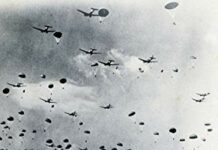
Ebook Info
- Published: 1999
- Number of pages: 631 pages
- Format: PDF
- File Size: 2.03 MB
- Authors: Antony Beevor
Description
The Battle of Stalingrad was not only the psychological turning point of World War II: it also changed the face of modern warfare. From Antony Beevor, the internationally bestselling author of D-Day and The Battle of Arnhem.In August 1942, Hitler’s huge Sixth Army reached the city that bore Stalin’s name. In the five-month siege that followed, the Russians fought to hold Stalingrad at any cost; then, in an astonishing reversal, encircled and trapped their Nazi enemy. This battle for the ruins of a city cost more than a million lives. Stalingrad conveys the experience of soldiers on both sides, fighting in inhuman conditions, and of civilians trapped on an urban battlefield. Antony Beevor has itnerviewed survivors and discovered completely new material in a wide range of German and Soviet archives, including prisoner interrogations and reports of desertions and executions. As a story of cruelty, courage, and human suffering, Stalingrad is unprecedented and unforgettable.Historians and reviewers worldwide have hailed Antony Beevor’s magisterial Stalingrad as the definitive account of World War II’s most harrowing battle.
User’s Reviews
Reviews from Amazon users which were colected at the time this book was published on the website:
⭐Anthony Beevor wrote a solid well researched history of The Battle of Stalingrad. Many historians correctly argue that the Battle of Stalingrad was “the turning point” of WW II in Europe. While Hitler and Stalin made miscalculations and blunders during the German invasion of the USSR (June 22,1941) known as Operation Barbarossa, Hitler was the one whose egomania was fatal to the Germans and his own political power. Or, as the adage goes, “Pride goes before the fall” which Hitler & co. realized too late.Beevor correctly wrote (page 33) that Hitler was so over confident that early during the German invasion of the USSR, Hitler refused to prepare the Germans for total war re the German economy and all-out war. Hitler and his advisers demeaned the Russians and other Slavic peoples as inferior and subhuman. Such arrogance was enhanced by easy German victories Yet, some German commanders were uneasy with the invasion, and von Ribbentrop had a premonition of potential when negotiations collapsed leading the war. As Beevor and other Russian/Soviet historians noted, von Ribbentrop told the Soviet foreign minister, Molotov, to apologize to Stalin for the upcoming war. As an aside Burton Klein’s book titled GERMANY’S ECONOMIC PREPARATIONS FOR WAR illustrated Hitler’s refusal to prepare for total war until the war was brought to the Germans in 1944.Among the major blunders committed by Hitler and his commanders was the brutal mistreatment of Slavic people and Jewish people. One German commander who had a conscience, commander Groscurth, wrote to his wife that with such calloused brutality that the Germans should not be allowed to win the war. A few other German commanders expressed similar sentiments which obviously “fell on deaf years.” This cruelty was a blunder because in engendered hatred vs. the German invaders resulted in a fierce partisan warfare behind German lines which caused intense fear in the rear of German lines. Little did the Germans know about the reactions and hatred they incited.Not only did the Germans have to face a ferocious Red Army, they had to contend with Mother Nature. Beever argued that Hitler should have learned from the failed battle of Moscow (1941-1942) when General Winter helped defeat the Germans. Yet, the Germans renewed a drive toward Stalingrad. Beever described the hot summer of the Russian steppe which one German commander compared to the heat in Africa. The Germans thought the hot summer temperatures would be welcomed by the Germans. However, such warm temps were a hindrance to the Germans. The heat attracted insects to attack the wound of German casualties. The heat caused exhaustion among German troops.As Beevor wrote, the closer the Germans got to Stalingrad, Soviet resistance stiffened. For example, one Red Army soldier was severely wounded and lost the use of his right arm. When medics wanted to retire him from the combat, he responded that he could throw grenades with his left arm. What amazed the Germans were the women who manned antiaircraft guns. In spite of German bombardment, these brave women continued to man their guns in spite of the obvious danger when also impressed and encouraged their male counterparts.Further German blunders included reliance on Hungarian, Italian, and Romanian units protecting their flanks. The Romanians, Hungarians, and Italians fought bravely. However, the Soviets easily destroyed these troops. The “foreign” units known as Hiwis did not have the artillery and heavy tanks to oppose Soviet T 34 and other heavy tanks. The Germans discredited the Hiwis, but the Germans failed to mentioned were not adequately supplied to repel the better equipped Soviet troops. Soviet military discipline was severe and sometimes excessive. Appropriately 13,000 Soviet troops were executed for desertion, cowardliness, and dereliction of duty. A 19 yard junior lieutenant was shot because two of his men deserted from his platoon, but he had been at Stalingrad and did not know the men in his platoon. The excesses were relaxed but still severe.One of the situations that Hitler and German commanders did not want to face was street fighting in Stalingrad. Yet, German shelling bombing caused destruction and unintentionally created barricades and severe angles for Soviet troops. The Soviets had a loosely organized institution called the Stalingrad Street Fighting Academy whose troops were experts at street fighting and house-to-house combat. The fact was that the Germans did not have the manpower for protracted urban warfare.As the Germans found much to their chagrin, the Soviets were experts at camouflage. The Soviets would make images of Hitler to taunt Germans. When the Germans went to destroy these images, the images were armed with grenades.When the Germans used barbed wire to protect them from hand grenades. The Soviet Red Army troops attached hooks to their grenades which would attach to the barbed wire. Deadly Soviet snipers, including deadly women snipers, took their physical and psychological toll on the German troops.Beevor wrote sections that as German hopes were fading, Soviet morale increased. The Soviets knew that the Germans were dyeing from frost bite, severe famine, infections from wounds, and the usual combat. German physicians could not handle the increase casualty lists. The Soviet intelligence network was well aware of these conditions and made every effort to increase the misery and showed no mercy. Tragically, when Red Army troops were aware of the deplorable of their own comrades as POWs, they took terrible vengeance on German troops and the German wounded .The relentless Soviet pressure re Stalingrad is illustrated by the Christmas, 1942. The Germans tried as best they could to celebrate the Holiday. However, the Soviets did not care and attacked German positions regardless of the Holiday Season. What began as a touching attempt at Christmas celebration, the Soviets did not care and were, again, relentless in finishing General Paulus’ Stalingrad troops and command.Given the terrible German situation at Stalingrad, the German commanders and “rank-and-file” were bitter at Hitler, Goring, and other leaders of the Hitler regime. Promises of reinforcements, food, medical supplies, and leaves were unfulfilled. German commanders and troops were bitter at the Hitler regime for the terrible conditions suffered by both officers and NCOs. The Hitler promise of the “Phoenix rising from the ashes” was pure fantasy which the German survivors know.When von Paulus finally surrendered, Hitler, Goring, Himmler, and associates were furious. Hitler was bitter that Paulus and other German commanders did not “fight to the death.” The Hitler regime whined about losing Stalingrad when these megalomaniucs were primarily responsible for the huge loss at Stalingrad. As any alert reader knows, WW II was actually won or lost on the Russian Front.Anthony Beevor’s book is well done. His descriptions of the suffering and death of both the Germans and Soviets are vivid, and his statistics are as accurate as any researcher can do. Beever along with other HONEST historians bluntly make their case that the European theater of WW II was won or lost on the Russian Front. Readers who like good research and good written expression will appreciate this book.May 19, 2016James E. Egolf
⭐Those of us now, with few exceptions, have no memory of this time, when brutality ran rampant in the world. Mick Jagger wrote something like a good description in a song, the fighting stank and the devil wore a general’s rank. Stalingrad, to me, epitomizes the war on the Eastern front for its senselessness, lack of strategic foresight, poor tactics, and both sides’ total disregard for humanity and their own people in uniform. Neither side was prepared for total war and this was a grand example of what happened as a result. Beevor is superb, cannot find a better historian. This is a totally depressing book but an excellent account of this travesty.
⭐Read it.
⭐Antony Beevor’s Stalingrad is an interesting book for anybody who likes the World War II history.When I finished it I’ve got a strong impression that the author is much more favorable to the German side of the conflict. This was unusual particularly considering the following WWII history books: “When Titans Clashed”,
⭐revised and expanded edition by D.M. Glantz and J.M. House, and “Bloodlands”
⭐by T. Snider.Glatz and House are renowned military historians. They are both colonels, US army, retired.Timothy Snyder is a Professor of history at Yale. Personally I prefer these authors over Mr. Beevor.1. It seems that any author attempting to write a WWII books wants to bring something new to a reader. One of the main points of Mr. Beevor is that there were many Russians on the German side. He makes this point on the second page of the Preface of the book. These Russians were so called Hilfswillige (HIWIs) basically volunteer laborers who were former POW. With Germans being in the process of starving in excess of 3 million of soviet POW it is hardly surprising that some of them decided to try their luck with their captors. According to Snyder: “The German prisoner-of-war camps in the East were far deadlier then the German concentration camps.” “The Germans shot, on a conservative estimate, half a million Soviet prisoners of war. By way of starvation or mistreatment during transit, they killed about 2.6 million more.”(Bloodlands, p.183, 184). Glantz and House echo this comment:”…at least 3.3 million Soviet prisoners of war died in German hands through starvation, disease, and exposure, especially during the first year of the invasion. This represented 58% of the total number of Soviet soldiers captured by the Germans.” You will not find these numbers in the Bevor’s book. The major emphasis is on the fate of the German POWs. On page 420 of his book he describes the conditions in the POW camp for Germans: “Although prison camp rations had improved in the summer of 1943, they were still uneven, varying from camp to camp.” I guess one could say that in 1942 the rations of Soviet POWs were even: They were evenly absent. No wonder the ranks of HIWIs were filled with those who preferred life over death. Mr. Beevor keeps reminding a reader about Russian HIWIs throughout the book. I find this focus on HIWIs bit odd and somewhat out of place. It is true the subject of HIWIs is something that was not discussed in so many details in other books. But why is this so important for the battle of Stalingrad?2. It is my impression that Mr. Beevor draws a caricature of the Red Army: The solders are brainwashed and drunk. Their military tactics are primitive. Coordination between military units is nonexistent. The generals are drunkards as well. They just send their soldiers in the frontal assault in waves and brave Germans cut those poor bastards down with their machine guns and then carry the “dogged fighting retreats”. Concerning the frontal assaults; according to Glantz and House, on December 9th 1941, long before the battle of Stalingrad, Zhukov “issued a directive that forbade frontal assaults and instructed commanders to seek open flanks to penetrate into the German rear areas.”(Titans, p. 79). Of course there are German eyewitnesses of such frontal assaults. However I find such stories to be self-serving for the Germans who lost the battle. It is much easier to explain one’s failure by stating that the enemy was dumb but there were way too many of them than to admit that those subhuman could outsmart gallant Wehrmacht. It is surprising to see such stories taken at their face value and included in the book without any critical comments from the author.3. It seems to me that Mr. Beevor portrays the Germans in much more favorable light than the Red Army. Sometimes it feels that he is sorry for the Germans to loose: The Germans are homesick. They love Christmas, and miss their families and their homeland. They do on occasion shoot Jewish orphans, rob the locals from whatever has left, and starve soviet POWs but that is the war, right?4. Unfortunately such pro-German and anti- Red Army bias goes even further. Not only the German defense is applauded but daring Russian operations are downplayed.Case in point is a description of Major-General Badanov’s 24th Tank Corps 150 mile advance on the major German airfield at Tatsinskaya. After describing this daring raid Mr. Beevor sums it up by saying “Badanov, after this bold raid, found himself cut off for five days, badly mauled and out of ammunition.” (p.301) To meet this sounds like a failure of Badanov.Now I would like to contrast Bevor description of the raid with that of Glantz and House:“…Badanov’s 24th Corps aimed to seize the airfield and logistical complex at Tatsinskaia. He accomplished this mission but only at great cost. On Christmas Eve, the 24th Tank Corps, already reduced to fever than 80 of its initial complement of 200 tanks, penetrated to Tatsinskaia, destroying 56 German transport aircraft and rendered the airfield inoperable. Badanov held his position for four days and then escaped the German counterattack with the remnants of his force…Badanov also forced Manstein to keep XXXXVIII Panzer Corps in a defensive role rather than attempting to relive the city, and he drew 6th Panzer Division setting it up for decisive defeat by 2nd Guards Army.” (Titans p. 184).It seems that for Mr. Beevor Badanov’s raid is nearly a failure whereas for Glantz and House it is a major achievement.There is at least one other Red Army raid that is basically ignored by Mr. Beevor. This is Maj. General Rodin and Lieutenant Colonel Fillipov capture of the bridge over Don that took at least a paragraph in Glatz and House “When Titans Clashed” (p. 178), the book dealing with the entire Red Army war effort. Mr. Beevor’s book only tangentially mentions the same event in just one sentence. If the raid deserved a paragraph in the book about the entire war effort then why is it neglected in the book about the actual battle? Perhaps it did not fit the picture of dumb, drunkard Russians and gallant Germans.Bottom line: I would not discourage anybody from reading Mr. Beevor’s Stalingrad, however,I would certainly suggest to read some other books on the subject to get a more balanced view of this key WWII battle which turned the tide of that terrible war.
⭐If you want a no holds barred history of a terrible battle, this is the book. The battle itself was terrible, but the aftermath was worse. If you have a weak stomach, this is certainly not for you.
⭐The Soviets were on Hitler’s side originally as I understand. Dictators, psychopaths, paranoics and so on tend to get on. Then Hitler took too many uppers and decided that there was no room for another big cheese and invaded Russia. Just like – no – a bit like Napoleon he went too far too rapidly and his supply lines started to falter. Gross oversimplification of course. The heart of the book centres on the Soviet comrades’ absolutely incredible ability to survive plus, eventually, the genius of Svoiet generals to mount an effective counter attack. A must read.
⭐Military history books sometimes suffer from being a trawl through facts and figures which makes them a chore to read. Stalingrad strikes a good balance between presenting the facts whilst remaining readable. Antony Beevor leads up to the events at Stalingrad with some background to the siege and its aftermath. He presents a fairly broad view of the conflict, whilst regularly relying on short anecdotes to give things a personal feel. The book was pitched just right for me, with enough detail provided but remaining readable without too much effort. One downside, nothing to do with the book itself, is that the Kindle isn’t the best device for displaying the maps and photos (that would be the hardback). As a 99p Kindle Daily deal though, it was an absolute bargain.
⭐Of the many books I have read this must rank as the most disturbing in terms of cruelty, betrayal and wanton murder of millions of all those poor innocent people, soldiers and civilians alike to satisfy a maniacs hatred.A real eye opener and brilliantly told by Anthony Beevor
⭐Like all military histories it requires understanding of maps as well as an understanding of armies and their strengths eg numbers in a Division. This account doesn’t offer much illumination on that front. Some would argue that Stalingrad marked the beginning of the Cold War with the victory of the Soviet Union over the Germans. Unfortunately this book makes that only too clear; we hear endlessly how evil Stalin was and the Soviet attempt to get rid of the invaders was really some sort of attempt to spread world revolution. Russians are devious, incompetent, chaotic and cruel; Germans bravely resist although they are let down by the madman Hitler. No doubt it’s how the Prussians would describe it, if there was a Prussia left.
⭐Wow, if you have any interest in WW2 then this is an essential read. A real insight into the “hell” that both sides endured in one of the most brutal battles ever.The detailed accounts from both sides is gut wrenching from the perspective of the common soldier, the complete contempt for life is brought out for all readers to see.If you weren’t’ aware of Hitler’s downfall you will be after this, compelling reading throughout.
Keywords
Free Download Stalingrad: The Fateful Siege: 1942-1943 in PDF format
Stalingrad: The Fateful Siege: 1942-1943 PDF Free Download
Download Stalingrad: The Fateful Siege: 1942-1943 1999 PDF Free
Stalingrad: The Fateful Siege: 1942-1943 1999 PDF Free Download
Download Stalingrad: The Fateful Siege: 1942-1943 PDF
Free Download Ebook Stalingrad: The Fateful Siege: 1942-1943





